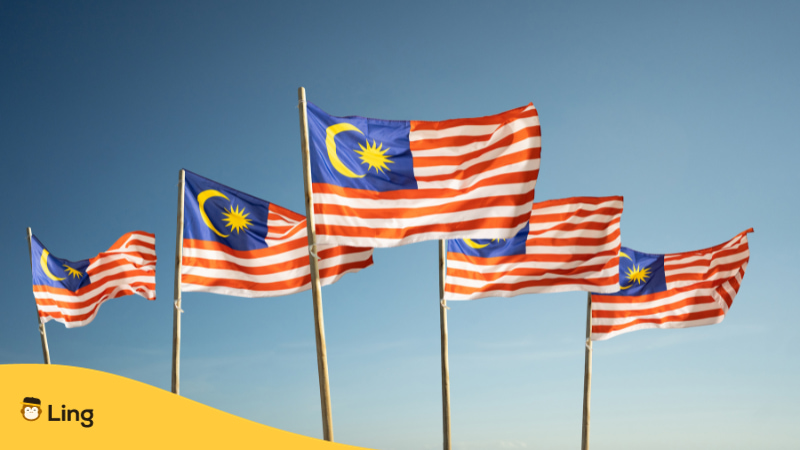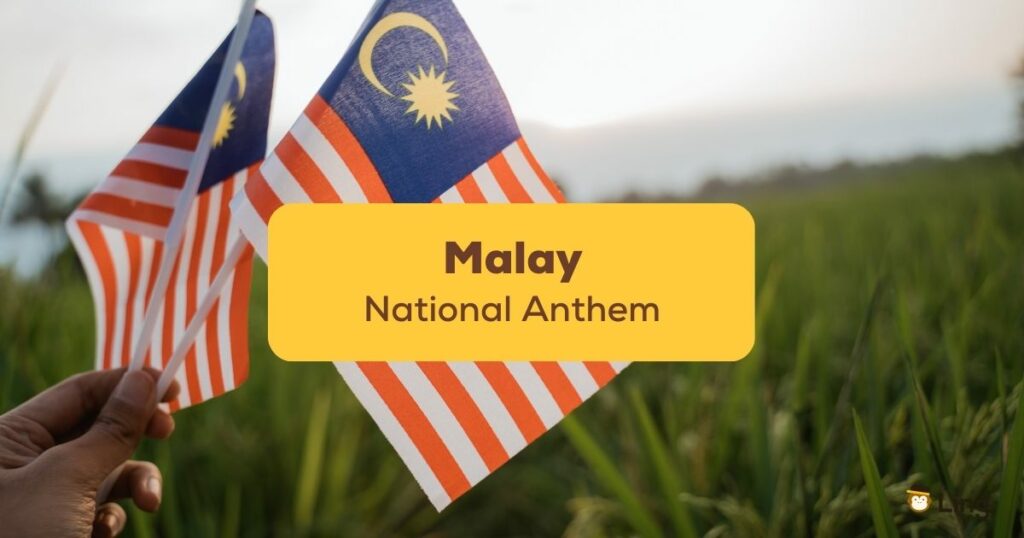The words to Malay national anthem hold a special place in the hearts of the country’s citizens, representing the cultural and historical fabric of the nation. Embark on a captivating journey through time to explore the fascinating history behind the creation and evolution of “Negaraku,” a song that has become a cherished symbol of Malaysian identity.
Let’s learn more about Malay and how learning the words to Malay national anthem will help us understand this language better.
Origins Of The Malay National Anthem
The origins of the Malay national anthem can be traced back to the late 19th century during the British colonial period. In 1895, a patriotic poem titled “Allah Lanjutkan Usia Sultan” (God Prolong the Sultan’s Life) was penned by a Malay scholar, Abdullah bin Abdul Kadir. This poem played a significant role in inspiring nationalistic sentiments among the Malay community.
Evolving Lyrics
Over the years, several renditions of the Malaysian national anthem emerged before the final version of Negaraku was established. One notable version was “Terang Bulan” (Bright Moon), a popular song often associated with the nationalistic movement. Although it was not an official anthem, Terang Bulan embodied the spirit of patriotism and unity that Malaysians aspired to achieve.
The Birth Of Negaraku
It was not until Malaysia gained independence from British rule on August 31, 1957, that the need for an official national anthem became evident. Prior to this, each of the 11 individual states had its own regional anthem.
The government initiated a competition to compose a new anthem that would embody the nation’s aspirations. The competition was made global, and a total of 514 entries were eventually received.
The task of choosing the new national anthem was given to a special committee of judges, including the renowned Malaysian composer Tunku Abdul Rahman, who would later become the country’s first Prime Minister. Unfortunately, none of the entries was deemed acceptable, even though they included submissions by famous British composers Benjamin Britten and Sir William Walton. Eventually, Tunku Abdul Rahman suggested the Malaysian National Anthem be an adaptation of the Perak State Anthem because of its “traditional flavor” and special links to the exiled Sultan Abdullah of Perak.
A collective effort by a group of composers led by Abdul Samad Ismail transformed the anthem of Perak into what is now the Malaysian national anthem. The lyrics were written by another prominent figure, Haji Mohamed Hashim, who was known for his talent in composing patriotic songs. Their composition, Negaraku, was chosen as Malaysia’s official national anthem in 1957.

Symbolism Of Words To Malay National Anthem
Want to memorize the words to Malay national anthem faster? Then we recommend you to use the Ling app. Download the Ling app today at the App Store or Google Play and discover the world of languages that awaits.
| English | Malay |
|---|---|
| My Country | Negaraku, |
| The land where my blood has spilled | Tanah tumpahnya darahku, |
| The people living united and progressive | Rakyat hidup, bersatu dan maju, |
| May God bestow blessing and happiness | Rahmat bahagia, Tuhan kurniakan, |
| May our King have a successful reign | Raja kita, Selamat bertakhta! |
| May God bestow blessing and happiness | Rahmat bahagia, Tuhan kurniakan, |
| May our King have a successful reign | Raja kita, Selamat bertakhta! |
Words by: Tunku Abdul Rahman. Music by: Pierre Jean de Beranger.
Negaraku’s music and lyrics carry deep symbolism and reflect the values and aspirations of the Malaysian people. The anthem’s verses and chorus encapsulate the love for the country, unity among its people, and the pursuit of progress and harmony.
The first verse emphasizes the significance of the nation, the unity of its people, and the blessings bestowed upon them by God and the monarchy. It sets the tone for the anthem, reminding Malaysians of their shared heritage and the sacrifices made for independence.
The chorus, with its vibrant and uplifting melody, reflects the aspirations of Malaysians. It calls for the prioritization of the people’s well-being, the pursuit of achievements through government support, and the collective journey toward eternal happiness and prosperity.

Evolution And Modern Usage Of The Malay National Anthem
Since its inception, Negaraku has undergone subtle changes in its composition, new lyrics, arrangement, and instrumentation. Over time, the state anthem has been adapted to be performed by different musical ensembles, including orchestras and military bands. These adaptations enhance the anthem’s grandeur, traditional flavor, and solemnity during official events, national ceremonies, and sports competitions.
In 1992 the National anthem was given a faster beat. However, this was an unpopular move and was derided as sounding like circus music. In 2003, it was reported that the name of the national anthem might be changed from Negaraku to Malaysiaku, which translates as My Malaysia. Again the idea was met with outcry, and it was decided that the song would revert to its pre-1992 version, and that would be the end of the matter.
Negaraku stands as a testament to the resilience, patriotism, and unity of the Malaysian people. From its origins as a patriotic poem and regional anthem to its selection as Malaysia’s national anthem, Negaraku has become a powerful symbol of the country’s identity. Its lyrics reflect the aspirations and values Malaysians cherish, and its melodious notes inspire a sense of pride and belonging. As Negaraku continues to resonate within the hearts of the Malay population, it will forever remain an enduring emblem of the nation’s history and future.
Discover More Malaysia With The Ling App
If you are keen on learning Malaysian as well as more about the country’s people and culture, then the Ling app is the tool for you. The Ling app features fun games, quizzes, and lessons developed by native speakers specifically to make learning a new language as easy as possible.
































































